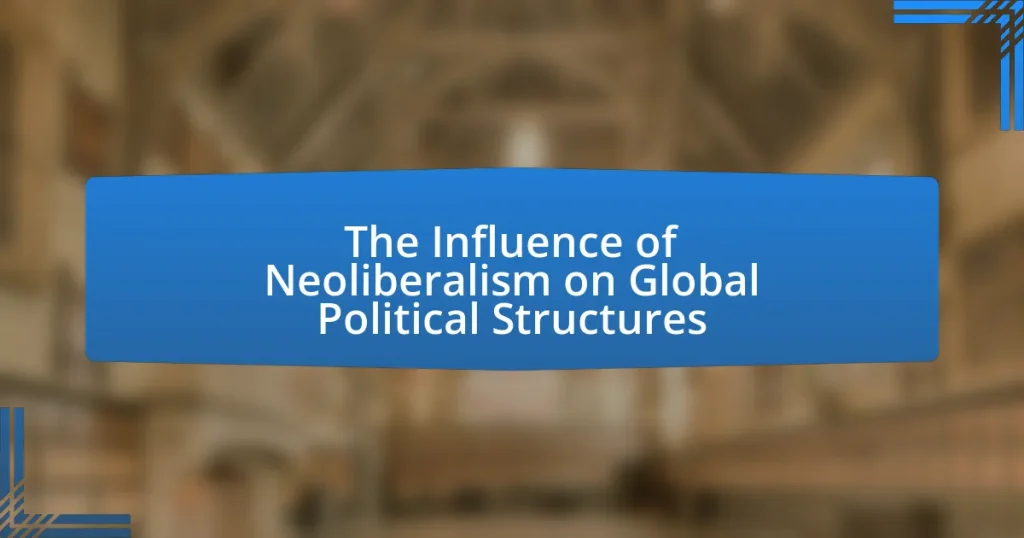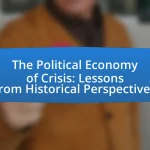Neoliberalism is a political and economic ideology that emphasizes free-market capitalism, deregulation, and reduced government intervention in the economy, significantly influencing global political structures. This article examines the emergence of neoliberalism as a dominant ideology in response to the economic crises of the 1970s, highlighting key figures and institutions that promote its principles. It discusses the core tenets of neoliberalism, its impact on global governance, and the resulting changes in international relations, as well as the criticisms regarding its role in exacerbating inequality and undermining democratic governance. Additionally, the article explores the future prospects of neoliberalism in light of emerging global challenges and proposes alternatives and strategies to address its negative implications.

What is the Influence of Neoliberalism on Global Political Structures?
Neoliberalism significantly influences global political structures by promoting free-market capitalism, deregulation, and reduced government intervention in the economy. This ideology has led to the restructuring of state functions, prioritizing market solutions over public welfare, which is evident in policies that favor privatization and trade liberalization. For instance, the Washington Consensus, a set of economic policy prescriptions for developing countries, exemplifies how neoliberal principles have shaped international financial institutions like the International Monetary Fund and the World Bank, pushing for austerity measures and structural adjustments. These changes have often resulted in increased inequality and social unrest, as seen in various countries where neoliberal reforms have been implemented, such as Chile in the 1970s and more recently in Greece during the European debt crisis.
How did neoliberalism emerge as a dominant political ideology?
Neoliberalism emerged as a dominant political ideology in the late 20th century, primarily in response to the economic crises of the 1970s, characterized by stagflation and declining economic growth. This ideology gained traction through the advocacy of key figures such as Milton Friedman and the Chicago School of Economics, who promoted free-market principles, deregulation, and privatization as solutions to economic stagnation. The implementation of neoliberal policies was notably advanced by political leaders like Margaret Thatcher in the United Kingdom and Ronald Reagan in the United States, who enacted reforms that reduced the role of the state in the economy, emphasizing individual entrepreneurship and market competition. The success of these policies in revitalizing economies during the 1980s solidified neoliberalism’s status as a prevailing political ideology, influencing global political structures and economic policies worldwide.
What historical events contributed to the rise of neoliberalism?
The rise of neoliberalism was significantly influenced by the economic crises of the 1970s, particularly the oil crisis and stagflation, which challenged the Keynesian economic model. These crises led to a shift in economic policy, favoring free-market principles and deregulation as solutions to economic stagnation. The election of Margaret Thatcher in the UK in 1979 and Ronald Reagan in the US in 1980 marked pivotal moments, as both leaders implemented neoliberal policies that emphasized privatization, reduced government spending, and tax cuts. Additionally, the fall of the Berlin Wall in 1989 symbolized the decline of state-controlled economies in Eastern Europe, further promoting neoliberal ideologies globally. These events collectively established a framework that prioritized market mechanisms over state intervention, solidifying neoliberalism’s influence on global political structures.
How do key figures and institutions promote neoliberal principles?
Key figures and institutions promote neoliberal principles by advocating for free markets, deregulation, and privatization. Prominent economists, such as Milton Friedman, have influenced policy through their research and recommendations, emphasizing the efficiency of market mechanisms over state intervention. Institutions like the International Monetary Fund and the World Bank implement neoliberal policies by conditioning financial assistance on structural reforms that favor market liberalization and reduced government spending. These entities have historically supported policies in countries facing economic crises, reinforcing neoliberal frameworks globally, as seen in the economic adjustments imposed during the Latin American debt crisis in the 1980s.
What are the core tenets of neoliberalism?
The core tenets of neoliberalism include free markets, deregulation, privatization, and a reduction in government spending. Free markets emphasize minimal government intervention in economic activities, promoting competition and efficiency. Deregulation involves removing restrictions on businesses to foster innovation and growth. Privatization transfers ownership of public services and assets to the private sector, aiming to enhance efficiency and reduce public expenditure. Lastly, a reduction in government spending focuses on limiting state involvement in the economy, advocating for fiscal austerity. These principles have shaped global political structures by influencing economic policies and governance models worldwide.
How does neoliberalism define the role of the state in the economy?
Neoliberalism defines the role of the state in the economy as primarily that of a facilitator of free markets rather than an active participant. This perspective emphasizes minimal state intervention, advocating for deregulation, privatization of state-owned enterprises, and the reduction of government spending on social services. The rationale is that a limited state allows for greater efficiency and innovation within the private sector, leading to economic growth. Historical examples include the economic policies implemented in the United Kingdom under Prime Minister Margaret Thatcher and in the United States under President Ronald Reagan during the 1980s, which prioritized market mechanisms over state control.
What is the significance of free markets in neoliberal thought?
Free markets are central to neoliberal thought as they are viewed as the most efficient mechanism for allocating resources and driving economic growth. Neoliberalism posits that minimal government intervention allows for competition, innovation, and individual entrepreneurship, which collectively enhance overall societal wealth. Historical evidence supporting this significance includes the economic reforms in Chile during the 1970s under the Pinochet regime, where free-market policies led to substantial GDP growth, demonstrating the belief that deregulation and privatization can stimulate economic performance.
How does neoliberalism impact global governance?
Neoliberalism impacts global governance by promoting market-oriented policies that prioritize economic efficiency and deregulation. This shift leads to the reduction of state intervention in economic affairs, encouraging privatization and free trade, which can enhance global economic integration. For instance, the establishment of institutions like the World Trade Organization in 1995 reflects neoliberal principles by facilitating trade liberalization and reducing barriers. Additionally, neoliberalism influences international relations by fostering a competitive environment among states, often prioritizing economic growth over social welfare, which can result in increased inequality and social unrest.
What changes in international relations can be attributed to neoliberal policies?
Neoliberal policies have led to significant changes in international relations, primarily through the promotion of free trade, deregulation, and the reduction of state intervention in economies. These policies have facilitated the globalization of markets, resulting in increased interdependence among nations. For instance, the establishment of trade agreements such as the North American Free Trade Agreement (NAFTA) in 1994 exemplifies how neoliberalism has reshaped economic relationships, encouraging countries to lower tariffs and embrace open markets. Additionally, neoliberalism has influenced international institutions like the World Trade Organization (WTO), which advocates for trade liberalization and has expanded its role in mediating trade disputes. This shift towards market-oriented policies has also led to the rise of non-state actors, such as multinational corporations, which now play a crucial role in shaping global economic policies and influencing state behavior.
How do neoliberal practices influence global institutions like the IMF and World Bank?
Neoliberal practices significantly influence global institutions like the IMF and World Bank by promoting market-oriented reforms and austerity measures as prerequisites for financial assistance. These institutions often condition loans on the implementation of neoliberal policies, such as deregulation, privatization, and fiscal austerity, which aim to enhance economic efficiency and attract foreign investment. For instance, during the 1980s and 1990s, the IMF and World Bank implemented structural adjustment programs in countries like Argentina and Nigeria, requiring them to reduce government spending and liberalize their economies. This approach has been linked to both economic growth and social challenges, as evidenced by the mixed outcomes in various countries where these policies were applied.
What are the criticisms of neoliberalism’s influence on political structures?
Critics argue that neoliberalism undermines democratic governance by prioritizing market efficiency over public welfare. This perspective highlights how neoliberal policies often lead to reduced government intervention, resulting in weakened regulatory frameworks that can exacerbate inequality and diminish public services. For instance, the privatization of essential services can limit access for marginalized populations, as seen in countries like Chile, where neoliberal reforms led to significant disparities in healthcare and education. Additionally, critics contend that neoliberalism fosters a concentration of power among elites, as economic policies favor large corporations and wealthy individuals, thereby diminishing the political influence of ordinary citizens. This critique is supported by research indicating that neoliberal policies correlate with increased income inequality and reduced social mobility, undermining the foundational principles of democratic participation and equity.
How do critics argue that neoliberalism exacerbates inequality?
Critics argue that neoliberalism exacerbates inequality by promoting policies that prioritize market efficiency over social welfare, leading to wealth concentration among the elite. For instance, neoliberal reforms often include tax cuts for the wealthy and deregulation, which disproportionately benefit high-income individuals while reducing public services that support lower-income populations. A study by Thomas Piketty in “Capital in the Twenty-First Century” highlights that income inequality has surged in countries that adopted neoliberal policies, with the top 1% capturing a significant share of economic growth. This evidence supports the claim that neoliberalism systematically disadvantages the lower and middle classes, widening the gap between rich and poor.
What are the environmental implications of neoliberal policies?
Neoliberal policies often lead to environmental degradation due to prioritizing economic growth over ecological sustainability. These policies promote deregulation, which can result in lax environmental protections, allowing industries to exploit natural resources without adequate oversight. For instance, the expansion of fossil fuel extraction and deforestation has been linked to neoliberal frameworks that favor market solutions over regulatory measures. A study by the United Nations Environment Programme highlights that neoliberalism’s focus on free markets has contributed to increased greenhouse gas emissions and biodiversity loss, as seen in regions where environmental regulations have been weakened.
How does neoliberalism shape domestic political landscapes?
Neoliberalism shapes domestic political landscapes by promoting free-market policies, deregulation, and reduced government intervention in the economy. This economic framework often leads to the prioritization of individual entrepreneurship and competition, which can shift political power towards business interests and away from traditional welfare state models. For instance, countries that have adopted neoliberal reforms, such as the United Kingdom under Margaret Thatcher and the United States under Ronald Reagan, experienced significant changes in social policies, including cuts to public services and welfare programs, which altered the relationship between citizens and the state. These shifts can result in increased inequality and social stratification, influencing political discourse and voter behavior, as seen in the rise of populist movements that challenge established political norms in response to perceived economic injustices.
What role does neoliberalism play in shaping political parties and ideologies?
Neoliberalism plays a crucial role in shaping political parties and ideologies by promoting free-market principles, deregulation, and reduced government intervention in the economy. This economic framework has led many political parties, particularly center-right and some center-left parties, to adopt policies that prioritize privatization, austerity measures, and globalization. For instance, the rise of neoliberalism in the late 20th century, particularly during the Reagan and Thatcher administrations, significantly influenced political platforms, leading to a shift in party ideologies towards market-oriented policies. This shift is evidenced by the adoption of neoliberal policies in various countries, which often results in the alignment of political parties with corporate interests and a focus on individual entrepreneurship over collective welfare.
How does neoliberalism affect social movements and public policy?
Neoliberalism significantly impacts social movements and public policy by prioritizing market-driven solutions over collective action and state intervention. This economic ideology promotes deregulation, privatization, and austerity measures, which often undermine the capacity of social movements to mobilize effectively for social justice. For instance, the reduction of public spending on social services can weaken grassroots organizations that rely on state support, leading to diminished advocacy for marginalized groups. Furthermore, neoliberal policies can co-opt social movements by framing their goals within a market logic, thus diluting their original objectives. Empirical evidence shows that in countries like the United States and the United Kingdom, neoliberal reforms have led to increased inequality and social fragmentation, which in turn challenge the cohesion and effectiveness of social movements.
What are the future prospects for neoliberalism in global politics?
The future prospects for neoliberalism in global politics appear uncertain, as rising populism and economic inequality challenge its foundational principles. Neoliberalism, characterized by free markets, deregulation, and reduced government intervention, has faced criticism for exacerbating wealth disparities and failing to address social welfare. For instance, the World Inequality Report 2022 highlights that the richest 10% of the global population owns 76% of total wealth, indicating a growing discontent with neoliberal policies. Additionally, the COVID-19 pandemic has prompted many governments to reconsider austerity measures and prioritize public health and social safety nets, further questioning the viability of neoliberalism. As a result, while neoliberalism may continue to influence global politics, its dominance is likely to be contested by alternative economic models that prioritize equity and sustainability.
How might emerging global challenges reshape neoliberal policies?
Emerging global challenges, such as climate change, economic inequality, and public health crises, may significantly reshape neoliberal policies by necessitating a shift towards more interventionist and sustainable approaches. For instance, the increasing frequency of climate-related disasters has prompted governments to reconsider deregulated markets that prioritize profit over environmental sustainability, leading to policies that incorporate green technologies and regulations. Additionally, the COVID-19 pandemic highlighted the inadequacies of neoliberal frameworks in addressing public health, resulting in calls for increased state involvement in healthcare and social safety nets. These shifts are supported by evidence showing that countries with stronger government intervention fared better in managing the pandemic’s impacts, indicating a potential pivot away from traditional neoliberal tenets.
What alternatives to neoliberalism are being proposed in contemporary discourse?
Contemporary discourse proposes several alternatives to neoliberalism, including democratic socialism, social democracy, and participatory economics. Democratic socialism advocates for social ownership and democratic control of the means of production, aiming to reduce inequality and enhance social welfare. Social democracy seeks to balance free-market capitalism with strong social safety nets and regulatory frameworks to protect citizens’ rights and promote economic equity. Participatory economics emphasizes decentralized planning and direct participation in economic decision-making, aiming to empower individuals and communities. These alternatives are gaining traction as critiques of neoliberal policies highlight their role in exacerbating inequality and undermining public goods.
What practical strategies can be employed to address the challenges posed by neoliberalism?
Practical strategies to address the challenges posed by neoliberalism include promoting social welfare policies, enhancing regulatory frameworks, and fostering community-based economic initiatives. Social welfare policies, such as universal healthcare and education, can mitigate the inequalities exacerbated by neoliberal practices, as evidenced by countries like Sweden, which have successfully implemented such systems to ensure equitable access to essential services. Enhancing regulatory frameworks can prevent corporate overreach and protect public interests; for instance, the Dodd-Frank Act in the United States aimed to increase financial regulation following the 2008 financial crisis, demonstrating the effectiveness of regulatory measures. Additionally, fostering community-based economic initiatives, such as cooperatives and local currencies, empowers communities and reduces dependency on global market fluctuations, as seen in the success of worker cooperatives in Spain’s Mondragon Corporation. These strategies collectively challenge the neoliberal paradigm by prioritizing social equity and community resilience.


